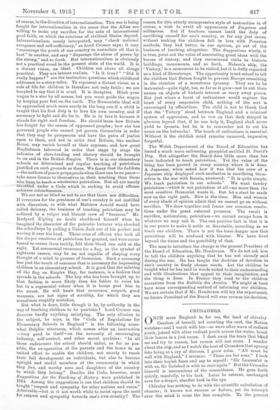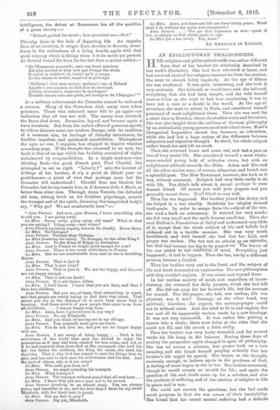CRUSADERS.
ONCE more England is, for me, the land of chivalry. Careless of herself, not counting the cost, the Nation watches—and I watch with her—as wave after wave of radiant youth, joined with other radiant youth across the water, break their lances in a just cause. I dash away the tears that blind me and try to reason, but reason. will not coins. I wander about the city, and as I watch the host of Crusaders that sprang into being at a cry of distress, I grow calm. "All must be well with England," I murmur. "'These are her eons." I look into their boyish faces and say to myself : "Sir Launcelot is with us, Sir Galahad is with us once again." But the Crusader himself is unconscious of the resemblance. lie goes forth quietly, manfully, to his task. ' Later he returns, unchanged save for a deeper, steadier look in the eye.
Chivalry has nothing to do with the scientific calculation of chances ; it knows not Success or failure, yet its triumph over the mind is none the less complete. To the poorest intelligence, the defeat at Roncevaux has all the qualities of a great victory :— " Roland gardait lee month; tons passaiont sans effroi."
Chivalry lives in the halo of departing life. An impulse diem of an occasion, it surges from devotee to devotee, some- times in the enthusiasm of a living breath, again with that quiet urgency which is fitting when it is lee marts qui portent. As Roland wound his born for the last time a nation rallied:—.
"Et l'Empereur poursnit; mais eon front soucieux Est plus sombre et plus noir quo Forage des cieux. II craint in trahison, et, tandis qu'il y songe, Le Cor eclat° et meurt, remit at se prolongs.
'Malheur! c'est mon nevou! malheur I car, si Roland Appelle a son secours, co dolt etre en mourant.
Arribro, chevaliers, repassons la montagne I Tremble encore sous nos plods, sol trompeur de l'Espa.gne !'"
As a military achievement the Crusades cannot be reckoned a success. Many of the Crusaders died, many were taken. prisoners. Those who returned came but to go again—an indication that all was not well. The enemy once checked, the flame died down. Jerusalem lapsed, and became again a terra irredenta. But from the united effort of generous spirits to relieve distress came our modern Europe, with its tradition of a common aim, its heritage of friendly intercourse, its kindlier impulses and quickened sensibilities. Throughout the ages no one, I suppose, has stopped to inquire whether pays. If the thought has occurred to us now, -the fault is that of an age which has foolishly conceived of rights
unbalanced by responsibilities. In a single sentence—one blinding flash—the great French poet, Paul Claude!, has
attempted to set us right. "Liberty P" asks the heroine of ..1$' Otago of her brother, it n'y a point de libertd pour un gentillionime—a point of view that perhaps none but the Crusader will understand I Claudel does not idealize his Crusader, but be represents him, in L'Annonee faite a Marie, as better than other men. Through Anne Vercors, the defeated old man, setting forth on his fruitless pilgrimage, sounds the trumpet-call of the spirit, drowning the vanquished body's cry, "Why P We are comfortable here" :—
" Anne Vercors. And now, poor Manton, I have something else to tell you. I am going away.
La Mere. Going away, going away, old man? What is that you are saying P Going away—and where? .Anne, Vercors (pointing vaguely towards the South). Down there. La Mere. To Chateau?
Anne Vercors. Farther than Chateau.
La Mire (toweling her voice). To Bourgos to the other King ?
Anne Vercors. To the King of Kings, to ierusalem.
La Mere. And is France no longer good enough for you P Anne Vercors. There is too much wickedness in France.
La Mere. But we are comfortable here, and no one is troubling Reims.
Anne Vercors. That is just it.
La Mere. That is just what?
Anne Vercors. That is just it. Wo are too happy, and the rest are not happy enough.
La Aare. That is not our fault !
Ann. Vercors. It is not theirs, either.
La Mere. I don't know. I know that you are hero, and that I have two children.
Anne Vsreere. But you see, at least, that everything is upset, and that people are vainly trying to find their way about. That smoke you see in the distance—it is more than straw that is burning. And these crowds of poor people that come to us from all directions. . . . I can no longer stay here. La Mr& Anne, have I grieved you in any way P Anne Vercors. No, my Elizabeth.
La Mire. And you think of leaving me in my old ago. Anne Vercors, You, yourself, must give me leave.
La Mere. You do not love me, and you are no longer happy with me.
Anne Venom I am weary of being happy, . . . Such is the misfortune of the world that each has wished to enjoy his possessions ae if they had been created for him alone, and not as )f ho had received them from God at His command—the lord his fief, the father his children, the King his realm, the clerk his dignities. That is why God has caused to pass the things that do pass, and has sent to each man his deliverance and his fast. And the part of others, why is it not mine P La Mere. Who calls you from us ?
Anne Vercors. An angel sounding his trumpet.
La Mere. What trumpet ?
Anne Vercors. The trumpet without sound that all men hoar ...
La Mare. I know that you are a man not to be moved.
Anne Vercors (tenderly, in an altered tone). You are always young and beautiful to me, and the love that I have for my sweet Elizabeth, with the black hair, is great. La Mere. But my hair is grey Anne Yeecers. Say yes, Elizabeth. La Mere. Anne, you have not left me these thirty years. What shall I do without my guide and companion ? Anna Vercors. . . The yes that separates us now—speak it low, as plainly as that which made its ono. La Mire (in a low voice). Yes, Anne."
AN AMERICAN IN LONDON.

















































 Previous page
Previous page